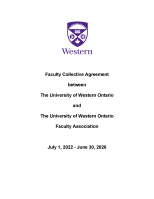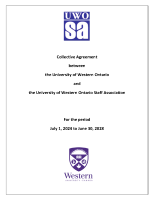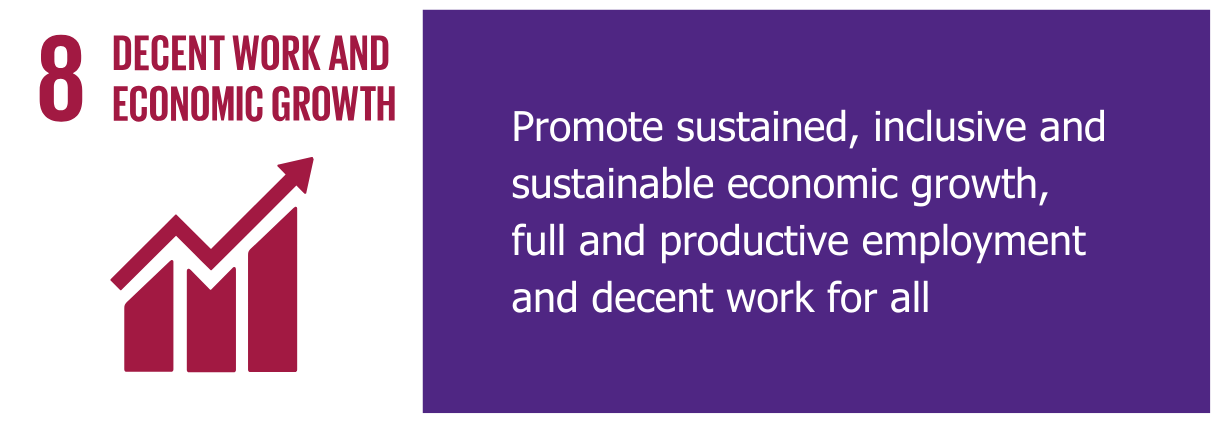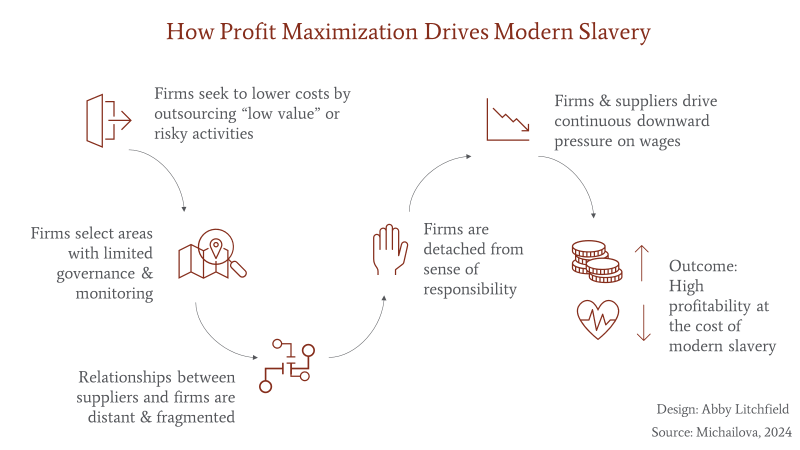SDG 8 - Strategic Initiatives
At Western University, we are committed to supporting decent work and economic growth in line with the United Nations Sustainable Development Goals. 100% of our employees receive remuneration equivalent to at least a living wage. We publicly share employment data using Statistics Canada. Below, you will find an overview of how our policies ensure fair treatment for all employees, with a focus on pay scale equity, measuring the gender pay gap, and protecting employee rights.
- Employee Groups & Collective Agreements
- POLICY 3.12 – Disconnecting from Work Policy
- POLICY 3.2 – Employment Equity Policy
- POLICY 3.8 – Employee Assistance Program
- POLICY 6.14 – Problem Resolution
- POLICY 6.2 – Compensation Plan
- POLICY 6.3 – Career Opportunities
- POLICY 8.5 – Dispute Resolution
For more details, please explore our full set of policies and agreements.
Unions and Labour Rights 
Western respects and upholds the Canadian and provincial legislations related to unions and labour rights.
Western’s workforce includes many employee groups. All employees may participate in these groups and will not be discriminated against on the basis of race, ancestry, place of origin, colour, ethnic origin, citizenship, creed, sex, sexual orientation, gender identity, gender expression, age, record of offences, marital status, family status, or disability. Some of our employee groups are represented by unions and subject to collective agreements:
- CUPE Facilities Management
- CUPE Hospitality Services
- Faculty Association
- Graduate Teaching Assistants
- Librarians & Archivists
- Operating Engineers
- Western Special Constable Service
- Postdoctoral Associates
- UWOSA
In Canada, labour rights, including freedom of association and collective bargaining, are protected under several legal frameworks. The Canadian Charter of Rights and Freedoms includes the right to join unions and engage in collective bargaining. The Ontario Labour Relations Act prohibits employers from interfering with the formation or administration of a union or from discriminating against employees for union activities. It also affirms the right to strike and lockout.
Rights of Workers 
Western University upholds the rights of workers when outsourcing activities to third parties through its practice of Sustainable Procurement. The offices of Procurement Services and Sustainability have developed Guidelines for Sustainable Procurement that consider worker safety. Our Sustainable Procurement Strategy 2023-2025 focuses on governance to reduce the risk of child labour, human trafficking, and labour exploitation. As a Fair-Trade certified campus, Western demonstrates its commitment to the fair and ethical treatment of workers. We are dedicated to sourcing in an ethical, legally compliant, and socially responsible manner, expecting our suppliers to adhere to the standards outlined in our Supplier Code of Conduct.
Pay Scale Equity 
Western University is committed to fair and equitable pay for all employees. We have several policies and practices in place to ensure that employees, regardless of background, receive equal compensation for their work. 
Our efforts include:
- Employment Equity Committee: This committee, outlined in our MAPP 3.2 policy, oversees equitable pay practices, working closely with our Human Resources and Equity, Diversity, and Inclusion (EDI) offices.
- Collective Agreements: Our collective agreements include provisions that support fair pay and regular reviews, ensuring all employees are compensated fairly (e.g. UWOSA and UWOFA).
- Ontario Pay Equity Act Compliance: We adhere to the Ontario Pay Equity Act, which requires employers to take a proactive approach to correct gender-
 based wage gaps within their organization through tracking of job compensation rates by job class and gender predominance.
based wage gaps within their organization through tracking of job compensation rates by job class and gender predominance. - Published Salary Ranges: Compensation ranges for all staff classifications are posted for current employees and job applicants and are applicable regardless of citizenship, race, place of origin, ethnic origin, colour, ancestry, disability, age, creed, sex/pregnancy, family status, marital status, sexual orientation, gender identity, gender expression, receipt of public assistance (in housing), and record of offences (in employment) (e.g., PMA and UWOSA).
Tracking Gender Pay Equity 
We believe in transparency and regularly monitor gender pay equity to ensure fairness across our institution.
Our efforts include:
- Pay Equity Audits: Our Human Resources department conducts regular audits to monitor pay equity across different genders and job categories.

- Career Trajectory Adjustments: Applicable for all faculty, librarians, and archivists; salaries are reviewed approximately every 4 years to ensure pay is based on professional achievements and career progression, removing bias that may be gender based.
- Public Reporting: In compliance with our public sector mandate, we disclose the number and salaries of full-time teaching staff to Statistics Canada. We disclose the names, positions, salaries, and total taxable benefits of employees earning $100,000 or more annually, which is published by the Ontario government. We update the hiring range and salary plans annually.
- Pay Equity Maintenance: We monitor the gender predominance of job classes, job compensation rates, and evaluation of female-dominated job classes relative to male-dominated job classes, in compliance with the Ontario Pay Equity Act.
- Engagement with Pay Equity Commission: We collaborate with the Ontario Pay Equity Commission as required to resolve any pay equity disputes.
Employee Rights and Appeals 
We are committed to providing employees with clear and accessible processes to appeal decisions regarding their rights and pay.
Our efforts include:
- Grievance Procedures: Our collective agreements include detailed grievance procedures (e.g., UWOSA Collective Agreement – Article 8: Grievance Procedure and UWOFA Collective Agreement (Grievance and Arbitration), empowering employees to voice concerns and seek resolution.
- Appeal of job classifications: Our collective agreement (e.g., UWOSA, Article 44) includes a detailed process for review of support staff position classifications, including an appeal process engaging an unbiased but experienced external party to provide final classification decisions.
- Complaint Resolution: We follow protocols from the Ontario Labour Relations Board to handle complaints about pay or employment conditions fairly and promptly.
- Non-Discrimination and Harassment Policy: Employees are supported through a detailed process should they identify any employment practice or action against them that they feel is discriminatory.
- Human Rights and EDI Reporting: Employees can report concerns about discrimination or harassment through our Human Rights Reporting and EDI reporting mechanisms.
Ending Workplace Discrimination

Western University has comprehensive, institution-wide policies that address both anti-discrimination and anti-harassment, ensuring a safe, respectful, and inclusive environment for all members of the university community.
These policies apply across all areas of the university’s operations, including academic programs, employment practices, student services, and campus life. They apply regardless of prohibited grounds of discrimination in Ontario: race, ancestry, place of origin, colour, ethnic origin, citizenship, creed, sex, sexual orientation, age, disability, record of offences, marital status, family status, gender identity, or gender expression. This includes a clear commitment to protect women, transgender people, and all gender expressions, and to create safe workplaces.
- EDI Policy: We recognize that equity-seeking groups include but are not limited to women, members of racialized groups (visible minorities), Indigenous peoples, persons with disabilities, and LGBTQ2S+ individuals.
- Non-Discrimination/Harassment/Sexual Misconduct Policy: Discrimination, Harassment or Sexual Misconduct toward individuals, whether as members of any recognizable group or otherwise, violate the fundamental rights, personal dignity and integrity of individuals or groups of individuals and will not be tolerated.
- Procedures for reports of Discrimination or Harassment: All members of the University community share responsibility for ensuring and promoting a safe and respectful working and learning environment that is free from Discrimination, Harassment and Sexual Misconduct.
- Policy on Gender-Based and Sexual Violence (GBSV): The university is committed to providing and maintaining an environment in which GBSV is not tolerated. GBSV is defined as: Any sexual act or act targeting a person’s sexuality, gender identity and gender expression, whether the act is physical or psychological in nature, that is committed, threatened or attempted against a person without the person’s consent, and includes sexual assault, sexual harassment, stalking, indecent exposure, voyeurism, cyber harassment and sexual exploitation.
- Procedures for reports of GBSV: These procedures keep disclosures confidential and prioritize the well-being of the victim.
- Safe Campus Community Policy: Every member of the university community has the right to study, work, and conduct his or her activities in an environment free of violence.
- Western University Code of Student Conduct: Students are responsible for observing a standard of conduct that will contribute to the university’s mission, including respecting the rights, property, and well-being of other members of the university community and visitors to the campus.
These policies are supported by formal procedures for reporting, investigation, and resolution, ensuring accountability and protection for all. Western University continuously reviews and strengthens its policies to uphold a safe, inclusive, and respectful environment for all. Western has a dedicated Human Rights Office, which supports reporting any incidents of discrimination, harassment, or sexual misconduct.
Commitment Against Forced Labour
Western has a policy commitment against forced labour, modern slavery, human trafficking, and child labour.
Federally, the Criminal Code of Canada criminalizes human trafficking. In Ontario, laws such as the Employment Standards Act and Occupational Health and Safety Act protect young workers by setting minimum age requirements and ensuring safe working conditions. The Child and Family Services Act and the Combating Human Trafficking Act provide protections against exploitation and support for victims.
Western’s Supplier Code of Conduct establishes clear standards that all suppliers must follow, including a strict prohibition on forced and child labour. It also requires suppliers to uphold fair working conditions, and to ensure that workers are treated with dignity and respect.
Ivey’s Network for Business Sustainability explains how modern slavery is more widespread than most people realize.



